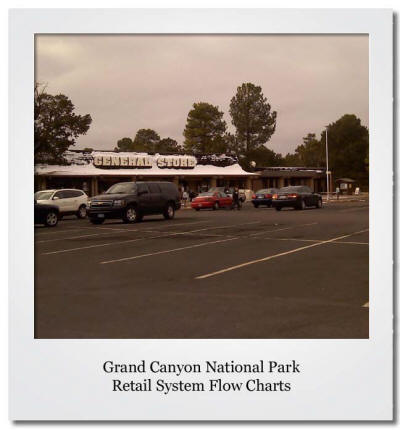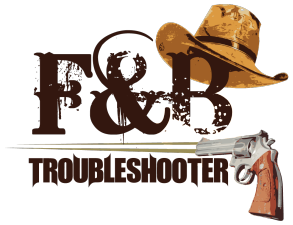
Grand Canyon Retail Stores Flowcharting
 The
owners of the company that operated a retail store outside
Grand Canyon National Park and two retail stores within the
park wanted to retire. They contracted with Delaware North
Companies (DNC) to buy them out.
The
owners of the company that operated a retail store outside
Grand Canyon National Park and two retail stores within the
park wanted to retire. They contracted with Delaware North
Companies (DNC) to buy them out.
Two weeks before the closing date, the owners agreed to
allow me to visit their offices inside the park for the
purpose of meeting with the accounting staff and documenting
the accounting systems.
The Controller had recently left the Company and DNC was
promoting someone from the Corporate offices to relocate to
the Grand Canyon and assume the role of Controller. My job
was to flowchart the accounting systems, identify the
internal control points (most important controls), and
report on internal control weaknesses with recommendations
to strengthen those weaknesses.
I met with the General Manager who gave me an overview of
how the accounting system worked. Then, I met with each of
the accounting people who explained to me how his/her area
of expertise functioned. As they were talking, I was
furiously scribbling notes on a note pad.
Having gone through the systems, I sat down with my
computer, opened the flowcharting software, and started
clicking on various symbols to represent the Revenue Cycle.
As I dragged the symbols to the proper position on the page,
I typed phrases into the symbol that described the function
a specific person performed. I connected the symbols with
lines and finished the page with a connector symbol that
would refer the process to the next page where the
description of the process continued.
When I finished flowcharting the Revenue Cycle, I reviewed
it with the personnel whom I had described in the Flow
Chart. I asked whether the process I had described was
correct or if modifications were needed. Usually, one or two
changes needed to be made. Changes are easy with software
because with a few clicks you can delete a symbol and
replace it with a different one and type a new description.
Once satisfied that the process described was correct, I
identified the control points, those controls that if
failed, serious repercussions could occur, i.e. employee
theft, significant undetected errors, etc. Once the control
points were identified, I reviewed the controls to ensure
they were adequate to detect theft or significant undetected
errors. Those I deemed to be inadequate I listed in my
report to management with recommendations that would
strengthen them.
I continued this process for the inventory cycle and the
payroll cycle. Among the three cycles, I covered all aspects
of running a Retail operation. When finished, I had the
revenue generation and accounting systems documented. The
new Controller could read my flowcharts and get a pretty
good understanding of how the accounting and operating
systems functioned.
(RETURN)
